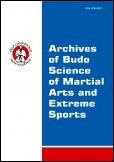2013, Volume 9, Issue 1
The effects of taekwondo courses on multiple intelligence development: a case study on the 9th grade students
Mutlu Turkmen1
1Physical Education and Sports School, Bartın University, Bartın, Turkey
Full text
Abstract
Background and Study Aim: During the last two decades Multiple Intelligence (MI) theory has been replaced with Intelligence Quotient (IQ) in order to increase the benefits of formal education programs. Within this frame various studies have been carried out to point out the inter-relation between sportive practices and intelligence development. The aim of this research was to investigate the possible effects of taekwondo training on the development of multiple intelligence levels of 9th grade students.
Material and Methods: This research applied the model of pre-test-post-test experimental design with experiment and control groups, each composed of 20 students. The experiment group attended to taekwondo training for 60 minutes per week during 12 weeks; and the control group continued to their standard education program. After 12 weeks multiple intelligence inventory was applied to both groups for the second time in order to find out possible changes in the multiple intelligence levels of the students. The findings of the inventory were evaluated using SPSS 17.0 for Windows program through arithmetic means, and independent samples t-tests.
Results: As a result of the research, it is founded out that the experiment group which took part in the taekwondo training achieved meaningful differences in bodily/kinaesthetic and interpersonal/social intelligence levels, which also led to the development of overall multiple intelligence level.
Conclusions: Different kinds of martial arts practices, which would be helpful for the intelligence development of the students, should be adopted as supplementary activities for school curriculum.
Key words: martial arts, taekwondo, intelligence quotient, multiple intelligence





